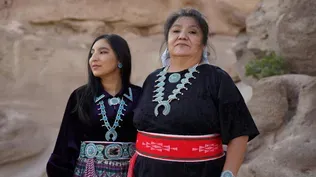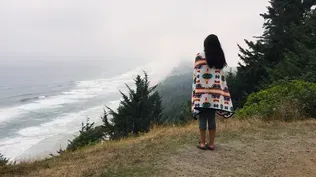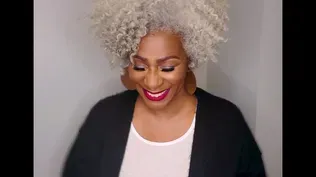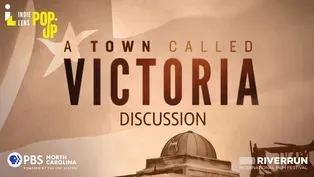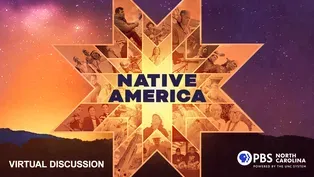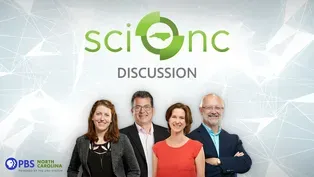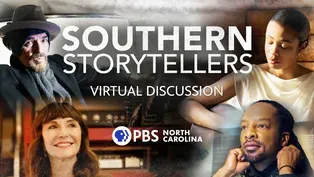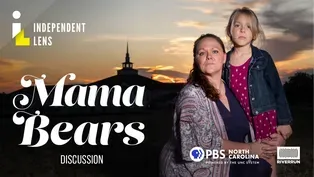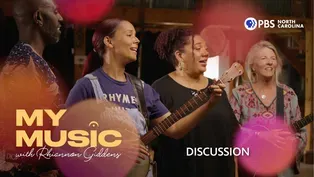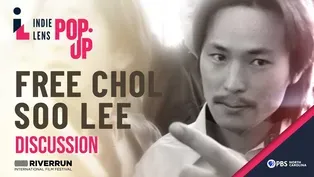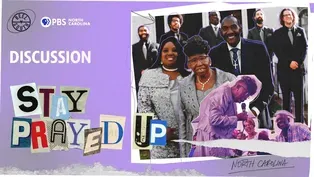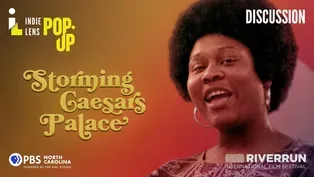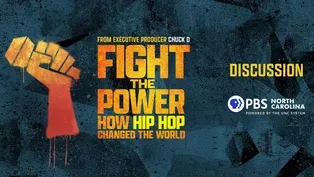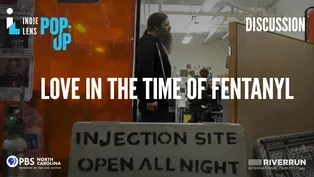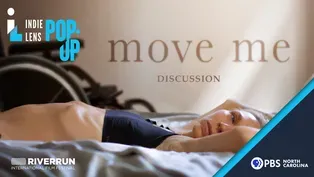PBS North Carolina Specials
Discussion | The Power of Personal Storytelling
3/25/2021 | 29m 24sVideo has Closed Captions
Discussing the power of stories with Jeff Polish, Omisade Burney-Scott & Sabrina Saleha.
Jeff Polish, executive director of The Monti, moderated a discussion on the power of personal storytelling with our panelists, Omisade Burney-Scott and Sabrina Saleha, who are featured in The Story of Us, NC, a half-hour special featuring North Carolinians using their voices to tell stories to inspire, entertain and paint a portrait of modern America. Learn more at pbsnc.org/americanportrait.
PBS North Carolina Specials
Discussion | The Power of Personal Storytelling
3/25/2021 | 29m 24sVideo has Closed Captions
Jeff Polish, executive director of The Monti, moderated a discussion on the power of personal storytelling with our panelists, Omisade Burney-Scott and Sabrina Saleha, who are featured in The Story of Us, NC, a half-hour special featuring North Carolinians using their voices to tell stories to inspire, entertain and paint a portrait of modern America. Learn more at pbsnc.org/americanportrait.
How to Watch PBS North Carolina Specials
PBS North Carolina Specials is available to stream on pbs.org and the free PBS App, available on iPhone, Apple TV, Android TV, Android smartphones, Amazon Fire TV, Amazon Fire Tablet, Roku, Samsung Smart TV, and Vizio.
Providing Support for PBS.org
Learn Moreabout PBS online sponsorshipMore from This Collection
Discussion - A Town Called Victoria - Independent Lens
Video has Closed Captions
The filmmaker and former Victoria residents share their story. (46m 51s)
Discussion - Native America Season 2
Video has Closed Captions
Panelists discuss preserving the languages of Native American tribes. (39m 1s)
Video has Closed Captions
Sci NC executive producer and host, Frank Graff, chats about upcoming Season 6 of Sci NC. (26m 6s)
Discussion - Southern Storytellers
Video has Closed Captions
Author David Joy and others discuss storytelling and their new PBS series. (42m 13s)
Discussion - Mama Bears | Independent Lens
Video has Closed Captions
Producer and director Daresha Kyi discusses the film and LGBTQIA+ advocacy. (34m 41s)
Discussion - My Music with Rhiannon Giddens
Video has Closed Captions
Discussing the series with producers Will & Deni McIntyre and country artist Rissi Palmer. (39m 56s)
Discussion - Free Chol Soo Lee | Independent Lens
Video has Closed Captions
Local lawyers, professors and nonprofit leaders discuss wrongful convictions and reentry. (40m 44s)
Discussion - Stay Prayed Up, Reel South
Video has Closed Captions
The filmmakers discuss their journey with Mother Perry and The Branchettes. (45m 4s)
Discussion - Storming Caesars Palace | Independent Lens
Video has Closed Captions
Local professors and nonprofit leaders discuss welfare and the social safety net. (33m 2s)
Discussion - Fight the Power: How Hip Hop Changed the World
Video has Closed Captions
Local experts discuss the history of hip hop with PBS North Carolina. (59m 43s)
Discussion - Love in the Time of Fentanyl | Independent Lens
Video has Closed Captions
Local harm reductionists, therapists and others discuss the opioid crisis and more. (55m 44s)
Discussion | Independent Lens: Move Me
Video has Closed Captions
A dancer with blindness and disability advocates discuss adaptable arts programs. (38m 46s)
Providing Support for PBS.org
Learn Moreabout PBS online sponsorship- Wow, those video stories were so great, I mean, the people in the videos are so interesting, so passionate, I wanna meet them.
Once again, I'm Jeff Polish and I'd like to welcome our special guests, the storytellers behind the stories that you just saw, Omisade Berney-Scott and Sabrina Saleha welcome.
- Hi, how are you?
- Great to have you, wonderful, those stories were awesome.
And thank you for being here with us for this conversation, I really appreciate it and it's gonna be a great conversation.
So it strikes me that there are many similar sentiments addressed in each of the three videos that we watched.
Something that all three of you indicated is how important it is for certain stories to be heard, to be included in the larger narrative, in fact, Omisade, you said... Something you said which is that listening and having someone... Oh actually no it's actually, I stand for storytelling is what you said in your video and the healing that is available to you by telling your story or listening to your story.
I loved when you said that because, listening to your own story, so important, telling your own story, so important, they exist in a continuum, but sometimes just listening to your story is enough, can you piece those two things out, listening to your story and then telling your story and how they're different and how they're both valuable?
- Sure, so, I think what I was trying to express is that, it's an exchange, in that, if I share my story with you, there are parts of my story that would resonate with you or resonate with Sabrina and that might provide some healing for you that you didn't even know you could access or was something that you needed and that it's reciprocal, that when you share your story with me, I also might be able to experience some healing, so the exchange is an energetic exchange, right?
So it's not just my ability to share my story and to have what I say, who I am, my journey, my humanity validated, affirmed, respected, 'cause there's healing in that, right?
But it's also my ability to listen to you and experience your personhood, your story, your journey and affirm that, so it's an energetic exchange that creates the portal for the healing that I think is available through storytelling and so that's what I was trying to express when I said that, it is definitely a two-way street when you tell a story or you hear a story, when you bear witness, it is the bearing witness part that I think is the energetic exchange.
- So important and actually Sabrina you said something similar, you said, listening and having someone's voice heard is the greatest gift of all.
I mean how important is that for you in your life from your culture and in your work in the national parks?
- Yeah, no, for sure.
I think in my experience I find that a lot of people like talking and I think that's really great, but not a lot of people listen, so something that I was taught growing up in school was like I needed to have a response, so I needed to raise my hand and it wasn't a positive thing if I just listened and so I feel like at least how I grew up in my communities, it's not rewarded to listen, it's rewarded to have a response and I think now that I'm older and I'm a storyteller and I like to tell [indistinct] my personal story, I think that's so critical and I just... Yeah, so I just think growing up and I was in the corporate world for a bit and yeah, I just don't think in general we are rewarded for listening and I think that is critical.
- So critical, I totally agree, so, I run a forum where I invite people to share stories on a stage and then there's an audience of people who are listening, they can't say anything, they're in the audience, right?
And there are times where a storyteller will get off the stage after they've shared something so deeply personal, so vulnerable, so exposing and to some might seem risky and you could see the power of what they had just done in their bodies, I mean sometimes I see them shaking with what they've done and then afterwards, when the lights come up and see how gratified people are to having had the experience of listening as you just said, there's so much energy in that room, it's an unbelievable thing.
So Sabrina, your You Me & The Parks project, I'm interested in this idea, like you have been traveling around to these parks, what's your process?
Do you go into the parks like how do you... How do you amplify the indigenous narrative?
What do you, go to the park ranger?
How does it work?
- It's a work in progress.
So my initially journey started...
I didn't really come to love the outdoors until later in life, until in college, I took a trip, so initially it was just traveling and then it was...
I like to go into the park ranger's office and they talk about the park and then what was interesting to me was the history and what I thought was missing in a lot of the parks was everything that happened before like 1950, that's typically like where the stories start and often the national parks were for me to protect the lands, but I feel like there's just such a huge chunk that is missing when you don't talk about the history of the original and still land protectors and also how some of the national parks came to be through forced removal of native nations.
So how I go about telling my story, still a work in process, I write blogs on social media and I guess platforms like this, it just really started with telling my friends that, hey I went to the parks and there's just this huge chunk of history that's missing and then it just kind of rolled into something more organic and something that I really enjoy and I think is just so critical and I love that people explore the outdoors, but I think it's critical in protecting their lands, that the history of it.
- Absolutely, so important.
So we do have a question from the audience for Omisade, just curious, why "Black Girl's Guide" not "Black Women's Guide" to menopause and do black women experience menopause differently than other groups?
- So, that's a great question.
It started off where I was trying to figure out during a creative sabbatical from social justice work, how to create a space where I could engage in some storytelling and listening conversations with either black women who are my age or older, about how they're experiencing menopause and how they're experiencing aging and my producer on the podcast, Mariah M. said, you know what it really is, it's the "Black Girl's Guide to Surviving Menopause," because I still see myself as a black girl, I think that one of the truisms about being a black woman, a black girl, a black fem identified person is that we are forced to grow up really quickly in this country and so there are stories that are still connected to my black girlhood, my black girl personhood, my black girlness that lives inside of me, inside of this 53 year old body, right?
And so, if I see stories as a mechanism of time travel, if I see stories as a possibility of healing, if I see stories as unearthing truths, then I don't mind it being a black girl's guide because, you're girlhood... For me, this past childhood there are still parts of myself that I'm excavating to have to do so much about who I was as a girl and the messages I heard about my rightness or my wrongness, around what I should have or not have, about my lovability, my value, about my humanity and so the "Black Girl's Guide" was a bit tongue in cheek but it's actually an affirmation that no matter how old I get, I still get to access the stories of this girl.
And truthfully, in terms of physiologically speaking menopause, no there are no physiological differences necessarily between black women, white women, API folk who are experiencing menopause and aging, however, we do know there are disparities within the healthcare system and we do know that stress can change your health outcomes, so what we do see in terms of black women and what they're experiencing because of stress, the stress of white supremacy, the stress of sexism, the stress of patriarchy, is that some of their symptoms come on earlier, they're more intense and they last longer.
So there's a study out there called the SWAN study, it's a long, long, longitudinal study on women's health and it talks about these differences in terms of white women, black women, Latinx women, API folk and saying, why is that the case?
And so, that's why it's the case and so, I wanted to center unapologetically the stories of black girls who might be in their 60s, who might be in their 70s, who might be in their 50s, who might be in their 90s and give them the space they deserve to tell their stories around their bodies and their aging and vulnerability and how they see life and so, that's why I named it that.
- Yeah, I get it and that you say that you took a break from social justice, but it seems to me that you're still doing that work in this project.
- I think you're right, I think your right.
I think what I did was a lane shift.
- Lane shift, right.
- I think it was a lane shift, I don't think that I truly or ever will divorce myself or remove myself from work that I'm so passionate about, right?
I think that what I'm giving myself permission to do, is to think about, well what lane are you in right now in your fifties?
Like what lane makes sense to you?
What's your offering to movement space to social justice work, to liberatory spaces and should it be the same thing it was when you were 40 or 30 or even 25?
And my answer is no, because I'm emerging, I'm changing, so as I evolve, my role likely will evolve and so, what's been consistent though is that I've always been a storyteller, which is interesting, right?
Because it's like, being able to put a pin in that as a tool and knowing how rich and potent storytelling is to social justice movement work, it's not lost on me without a doubt.
So, I think what people would say is that they've seen a lane shift in the way that I show up in spaces.
- Right and it's amazing yeah.
So, now to pivot to Sabrina for a moment, a question from our audience as well, how difficult is it to visit the national parks when this land originally belonged to native people in the first place?
- Yeah, I would say still does.
My love for the national parks is so complex and I guess let me take it back for a minute, so being a native person, it's almost as if I have a dual citizenship, I have Navajo nation and that is my sovereignty, so revisiting national parks and it's complicated, I love... For me personally, I love being outdoors, it brings me a sense of peace and for me to properly I feel like, do climate work and protect the parks is to tell the story, but it is really hard, I mean how I started You Me And The Parks wasn't a fun project, I mean it didn't happen that way, it happened because I felt invisible and I didn't want future generations to feel that for me and I don't want my future children to feel that way, I want them to be able to explore the parks and I want them to feel seen and to know the full history.
So it is incredibly difficult and I find joy in it, but it didn't come as, oh I have some free time, this is what I wanna do, it came from, the work I do is so people like me or my little cousins can visit the national parks and they don't have to go in and wonder, well where do I fit in?
And that is really the true purpose of the work I do.
- Yeah and from your piece, from the video piece, there's so many visuals of you in an educational space, not necessarily in the parks, right?
But you're in traditional dress and it looks like you're educating and bringing voice to your culture in a way that the people you might be speaking to don't really understand, which I think is... And again like Omisade said, she's always been a storyteller regardless of what she's doing and it sounds like you've been doing that your whole life as well.
- Yeah, I have.
So growing up, I grew up in Greensboro and there's a native organization called Guilford Native American Association and it was there where we had... You learned dances at pow wows and sharing stories and we would go to cultural festivals and I would listen to the MCs talk about each dance and then in middle school there was a pageant, so and native pageants it's really to go in the pow wow circuit to represent your region or tribe and tell stories.
So it is something that I am so thankful and blessed from the community I grew up in in Greensboro and the Guilford Native American Association and the strength and power that I bring through all of my life.
And honestly, I feel so thankful when I feel down or if I'm going through something tough, I know who I am, I know where my roots sets and that is the biggest gift from my community they gave me and that's what I hope to give to other people in my community and to share my culture, yeah.
- That's amazing, so let me...
This is a question from the audience for both of you.
So how does sharing these stories with people and especially the public at large help you deal with some emotions?
Does sharing make you feel better?
Does it enrich you?
Encourage others to share their stories, by telling yours are you encouraging others to share their stories?
Omisade.
- Okay, I was gonna punt but that's okay I'll... [Jeff laughing] - Well you can punt, hey, it's not my show.
- Okay fine, I think that stories live inside of all of us, right?
I think that from the youngest to the oldest person that you know, there are multiple stories that live inside of their bodies, but what's important for that person to be able to voice it, is for them to have agency and for them to feel safe, right?
And to feel affirmed and respected, I think that sometimes we wanna hear people's stories, we see someone and we're compelled by them or we make assumptions about them and we're like, wow, I bet they have a fantastic story to share and they likely do, but they need to be able to share it in their own time, of their own free will, with consent, right?
With respect and know that if they decide to share it it's gonna be held as a sacred thing and so I don't rush people to storytelling, I try to curate and create spaces they feel safe, right?
That feel sacred, that feel affirming and so if a person deci... And I create prompts and I say, hey, if you wanna answer this question, you can, but you don't have to answer it out loud, you can tell your story to yourself, that's why journaling is so important, people having spaces where they can have whatever they want, whatever tool or medium that they need to get their stories up and out, I think is important, but I don't always assume that the storytelling will happened with other people 'cause I tell stories to myself too.
And so I think it's important to do that and then when you move in this way that kind of starts peeling back these layers and opens up a space where a person says, I think I'm ready to tell parts of my story, they get to decide how much of the story they tell as well.
And we still... Once again, you don't get to push people into a space of readiness, because you're intrigued by them or compelled by them or are perceived to be a certain way or a certain thing, the first thing they are is a human being, the second thing is that their personhood no matter how they show up, no matter who they are, how old they are, is valuable and then, you can figure out a way and it's like, let's invite this conversation and then once you do that, I just feel like it just starts to unfold in this really beautiful, powerful way, but you always gotta return to, does this person have the agency to do that?
Do you have their consent?
Is it affirming, is it respectful?
And if those things are not operating in the storytelling space, then it becomes performative and potentially it becomes abusive and I don't want that ever to be the case when a person feels like their story's being told and they're being somehow pushed into a space of storytelling that they're not ready for, 'cause that's not what I'm interested in doing.
- It's interesting, I love what you just said and I was thinking about my own context of running this organization where people come to us to share stories and I find one thing or a couple of things interesting, number one is, it's so interesting why a person will come with a particular story at that moment in time and sometimes they aren't aware of why this story now?
But it's time, it's easy to see from my perspective that it's time for that story to come out, however there is the other side of it as well, which is, people come and they're eager to tell a story and I can tell that they're not ready and it's not necessarily for me to proclaim that, if they feel ready then I want them to have that agency, but I also know that they're going through something and they feel like they should tell it but I can tell that there's too much in there, in their body, there's tension and so we talk about it until we get to the point where they realize that it's not time.
And- [indistinct] - Excuse me?
- Can I share one more thing do you- - Oh please, please.
- So, I did not know my mother's story as a child, my mother was born in 1930 in Eastern North Carolina during Jim Crow, during the Great Depression, which means my mother was a teenager during World War II, right?
I didn't know a good portion of my mother's childhood story until she was in her 60s, I just didn't know, there were certain parts of her story that I don't know that she was able to access and she certainly didn't share it with my sister and I until we were adults and I recall before she passed away, sitting on a porch with her and just sitting there quietly, we're just relaxing and she just started letting it come up and out of her body and she told me so much about what it was like to be a little girl in Eastern North Carolina and to be really, really poor and figuring out where they were gonna live after her father passed away.
And I just sat, I didn't know what to do, I knew I was being given a gift, I knew it was a gift and I knew it was hard for her to get it up and out, so I didn't wanna interrupt her, 'cause I was thinking, what prompted this?
And what an amazing gift that she is giving me right now as her daughter to understand her better when she was a child.
So I do think the timing of it is important and that something that Sabrina said, your ability to listen and to not interrupt, because that was not my story, that was her story that she was getting out of her body, yeah.
- Yeah, I'm glad you told us that, that's amazing, it's so important to honor that moment.
So we're gonna be wrapping things up but I wanna ask you one last question which is, you created these stories that we saw here tonight and you've been a part of this conversation which I'm grateful for, what do you hope that people get out of this?
What would you like people in North Carolina, even outside North Carolina to know about you and the things that you're passionate about, Sabrina?
- Wow, I think what I hope other people get out of... Or at least what I got from sharing my own story, I'll start with particularly grief for me, I lost my brother in 2013 and that is something... Grief is something that never ends, so I found in this part of my grief journey that sharing my story and his story is my way of showing my brother love.
So, I shared a little piece in my heart and I shared my love and I don't know, thank you for listening for my brother's story because that's honestly the greatest gift you could give me and what I hope people can take from this, so much of what Omi said, when you're ready or there's different platforms to tell your story, you can journal, but to be in a safe space and I took down notes of her wise words 'cause I was like, stories are a time-traveling and they are healing.
[Sabrina laughing] Yeah, I just hope people can take away from this that there's power in telling your story and I often sought out stories and poems because I don't always have the right words, so if I could maybe in that point in time when I told that story about my brother, maybe help someone else in their grief journey as well.
- I'm sure you did, absolutely.
Omi?
- Yeah, I'm trying not to get emotional, I'm just sitting here thinking about how beautiful it is to tell stories that invite our immortality, right?
So, Sabrina telling her brother's story invites us to know him, right?
I'm hoping that the stories that I share will live long past I'm gone, yeah?
And that somewhere in there, my immortality exist, right?
The stories that I've shared, the person that I am, through my boys or through my future grandchildren or great-grandchildren like, stories actually have a way of being a way for you to live forever, right?
It's a way for you to live forever in a way and I think that that's a beautiful thing for someone to know your name, to know your story and to share your story over and over, so it becomes such a rich part of your existence after you're gone and I think it's a beautiful thing.
- Absolutely, it reminded me what you were saying about, we had a storyteller a few years back who shared a story about losing her father tragically to a massive heart attack and she told the story, it was beautiful and we filmed it and we posted it on social media and she put it out to her community, digital community and people started to write comments about stories about her dad, people that knew him and she sent me a text after a few days and said, you know this has been such a powerful experience for me because, through all of these stories, I feel like my father's alive again, I mean that is such a powerful statement and it's so true and it's exactly what you guys are talking about.
Okay so, we're running a little late here, but I do wanna thank you for joining us, it's been wonderful to see your video stories, it's been wonderful to talk to you, Omisade Burney-Scott and Sabrina Saleha thank you so much and I hope we see each other again very soon.
- Yeah.
- And now I'm going to talk us out.
So it's been a great conversation, but it's not just us who get to tell stories, it's you too.
So the PBS American Portrait initiative is ongoing and in the chat you can see a link where you too can take part in it and as I mentioned earlier some of the prompts, I'll mentioned a couple of others that you can respond to when sharing your stories, I'm letting go of... Now is the time...
Looking ahead I... Or at this point in my life... My greatest challenge is...
There's so many great prompts that you can respond to to get your creative narrative going and so you can find the link in the chat.
So, it's been great, that wraps up tonight and I appreciate all of you for coming, thank you to our special guests, Omisade Berney-Scott and Sabrina Saleha, thank you our audience for being so engaged and joining us this evening and on behalf of PBS North Carolina, thank you to our event partners, the State Library of North Carolina and The Monti, which is an organization I run, it was my pleasure to moderate this event, thank you.
And tell your story, like I just said visit PBS American portrait and share your story, thank you for your support of PBS North Carolina, become a member so this and other exciting free events and programming can continue to be made available.
Thank you for joining us tonight.
My name is Jeff Polish and good night.
